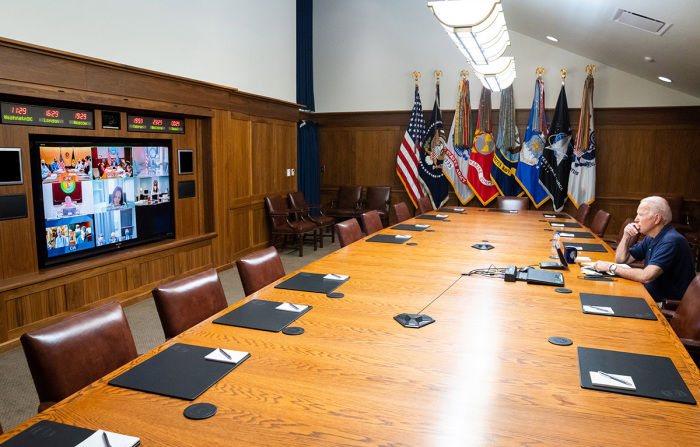Al Mohler says Pres. Biden, media downplaying the Taliban's Islamic theology
Over 10,000 Americans stuck in Afghanistan as Taliban hamper evacuations

President Joe Biden and left-leaning corporate news outlets are downplaying the Islamic theology behind the Taliban, according to Albert Mohler, president of Southern Baptist Theological Seminary.
In an episode of his podcast “The Briefing,” Mohler assessed the reaction of many to the return of the Taliban to power in Afghanistan and the rise of Islamic extremism elsewhere in the world, such as the Islamic State, also known as IS and ISIS, and its affiliates.
Mohler began by noting that some news outlets seem to prefer the term “ISIS” to describe the group, asserting that this is because “they want to avoid using the word ‘Islam’ or ‘Islamic.’”
“Notice how little attention, almost no attention at all, how much virtual silence you now hear in the mainstream media about the reality that the Taliban are not a secular army. They are a jihadist group of Islamic fighters,” Mohler said.
“The mythology of the American Left is that theology does not matter and that any reference to Islam as in a clash of religious worldviews is just a form of disguised racism or something they often refer to as ‘Islamophobia.’”
Mohler stressed that progressives need to understand that Islam makes “theological truth claims” and that “its morality is based on its theological structure and jihad is baked into the logic of the Quran.”
“It’s interesting to hear people talk about the humanitarian disaster as if what would be taking place, including the oppression of women, is just based upon some kind of tribal habit in Afghanistan,” he continued.
“It is not that. It is what is claimed to be the application of the Quran. It is coming with a religious, not a secular, authority; it is driven by religious, not secular, ambitions; it is driven by religious, not secular, passions.”
In response to the Taliban harboring al Qaeda terrorists and 9/11 mastermind Osama bin Laden, the United States invaded Afghanistan in late 2001 and, with the help of local guerilla groups, toppled the Islamist faction that had ruled Afghanistan from 1996-2001.
Despite U.S. intervention and the subsequent killing of bin Laden, the Taliban continued to resist the new regime in Afghanistan, leading a lengthy insurgency against coalition forces.
Over the past several years, the number of U.S. troops in the predominantly Muslim country had been drawn down, numbering 2,500 by the time President Joe Biden took office.
In February 2020, Trump announced that he had reached a deal with the Taliban, agreeing to an eventual withdrawal of remaining forces from Afghanistan if the Islamist group upheld several commitments, such as no longer harboring terrorist groups, including al Qaeda.
“The United States signed a deal with the Taliban so that we can hopefully begin the immediate process of finally bringing our troops back home,” Trump told the Conservative Political Action Conference last year.
“I want to just thank our military because we’ve been really a police force there for the last long time. We’re not supposed to be a police force, we’re supposed to be fighting soldiers.”
Earlier this year, Biden announced that he planned to withdraw the last of the U.S. forces by the beginning of September, despite reported concerns from his own military advisors.
With the American withdrawal, the Taliban went on the offensive and retook large parts of Afghanistan, including Kabul on Sunday, prompting a chaotic evacuation in which thousands of Americans were told to "shelter in place" and go online to register to evacuate.
Biden had announced that 5,000 U.S. troops would be deployed to help with the evacuation. On Sunday, the Pentagon announced that an additional 1,000 troops would be deployed to assist.
As many as 10,000 to 15,000 Americans have yet to be evacuated from Afghanistan, according to The Washington Post.
In response to the situation and the scenes of desperate Afghanis trying to board U.S. Air Force planes taxiing on the runway of Kabul’s international airport on Monday, Biden, who was on vacation and said he wasn't going to respond publicly until later in the week, decided to return to Washington and deliver a speech.
Biden said during Tuesday's speech from the East Room of the White House that the quick collapse of the Afghan forces “reinforced” his belief “that ending U.S. military involvement in Afghanistan now was the right decision.”
“American troops cannot and should not be fighting in a war and dying in a war that Afghan forces are not willing to fight for themselves,” said the president.
“Our mission in Afghanistan was never supposed to have been nation-building, it was never supposed to be creating a unified, centralized democracy.”





























